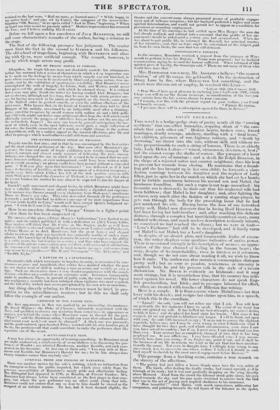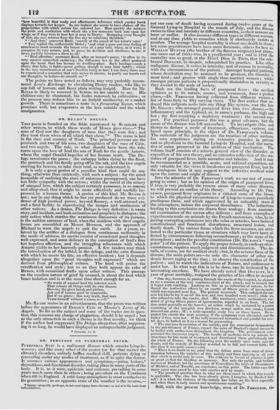Loy E'S E X 11 1 A N(1 E.
Tilt!: novel is tt hodge-podge story of pretty nearly all the " moving accidents" that can afflict humanitv, stopping short of the can- nibals that (!ach other cat:' BroCen hearts, broken N'OB s, forced marriages, deadly revenge, adultery, duelling with a ihtal issue," lost children, prisoners of war, highway robbery, and " death by drowning," are thrust into the tale, without skill, and without re- sults ptsquationable to such a string of horrors. There is an elderly
lady, Lady Helen I.41 Wisest, virtuousest, discreetest, best ; but she copilot escape the shafts of sorrow. Iler paragon of a lover died upon the eve of matriage ; and a devil, Sir -Ralph lloneton, in the shape of a rejected suitor and country neighbour, does his best to prevent her wounds from closing. Ile maintains that a found- ling girl she has brulight up is her own child; lie forwards a clan- destine marriage between his daughter and the nephew of Lady Ellen, just to spite bermn the match on which she had set her heart; and he forbids matrimony between his second son and label, the handsome foundling. But such a rogue is not to go unscathed : his flivourite son is drowned ; he finds out that his neglected wife had been fitithless; that Alabel is her daughter; and, after fighting the seducer, very much after the fashion of a ranting stage-player, he sets run through the body for the provoking boast that lie had
• ' Just murdered his wire. Having borne the loss of one betrothed pretty well, Alabc1 now discovers that in loving Basil Iloneton she had been loving her half-brother : and, after reaching this delicate distress, through a complex but Mart ificially-contrived story, many inflated reflections, and much useless description tediously minute, we conceived we had reached the climax ; but We were at lltult- " Love's Exchange" had still to be developed, and it finally turns out Mabel is not Mabel, but a Lord's daughter.
In despite or an absurd plan, and innumerable fltults of execu- tion, the writer displays some qualities indicative of' native power. There is occasional strength in his description of scenes : an appre- ciation ()I' the true channel of reching in the human heart ; the story, despite of its improbability, rises in interest as it advances, amid, though we do not care about reading it all, we wish to know how it ends. The author can also sustain n commonplace dialogue pretty well ; but as soon as passion, tenderness, or intensity is required, both he and his persons talk in the style of a tavern rhetorician. 'Air. Bo me iS evidently an Irishman ; and it may seem strange, but it is nevertheless true, that his country has mili- tated against his novel. His lower characters do not speak Eng- lish provhicialism, but Irish ; and in passages laboured tbr effect, we often are treated with touches of Milesian fine writing.
Here is a sample. It is from a scene where Mabel taxes her first lover with his deceit ; and resigns her claims upon him, in a speech, of which this is the exordium.
" she said, 'you will not refuse me what I ask. You will hear me patiently tie few moments I have to speak. The secret of toy heart has come out against nty will. It has bettled my best attempts, mv ('II Iii desire,
to hide it liere;' and she placed her hand lipmi her bosom. hut since it has
escaped, let me not pretend to blindness any longer. 1 will be frank and open with you,' she said with increased energy ; •1 mean not to convey the slightest reproach, believe me; and I may be even wrong in What I think—in what 1 have thought for two days past, told which circumstances, even since I saw you, have served to confirm ; but if so, I must own, I can understand you less than ever. Your manner has so completely changed uf late, that it lias long pet plexed me. It now afflicts me. 1 may bare offended you ; 1 mar uncon- sciously have done you wrong: if so. forgive me, point it out. alld it Awn be the fleshless of my life to redeem toe word or the act that has been uninten- tionally the cause. Not even in thought have 1 willingly done wrong to any one—nmeh less to one—to one who,. Welare I believed I should so WW1 bind myself to cherish by the most savred engagement before Heaven.' "
This passage from a hawking scene, contains a true remark on the slavery of the affections.
" The quarry had just fallen a heavy bloodv mass into the very midst of them. The hawk, after dealing the deadly stroke, had soared upward, as if in triumph at its work; bat it was now gradually dropping on the wing directly above Bernard. Aloof from the crowd the falconer stood quite alone, his eyes raised towards the sky, and his arm read ar
y stretched to receive bunk the bird that was in the act of payingsuch implicit obedience to his summons.
" flow beautiful cried 3lithel, with much earnestness, addressing her companion, and pointing towards the tall figure of the falconer as she spoke,
'bow beautiful is that ready and affectionate deference which yonder -hawk displays towards her keeper: In one instant she seems tti have shaken off the propensities with which nature has endowed her. How .quickly she subdues the pride and exultation with which she a few moments-back rose upon her wings, as if they were to bear her at once to liberty. Resigning every thought of this, she now returns from the free sky to voluntary thraldom.' 4" And that,' answered Basil, merelV at the sound of her tutor's voice.'
"Yes,' replied the enthusiastic Mabel 'and what a pure and true feeling of attachment must animate the bos,om even of a poor bird, when, as it were, it conquers its very nature, and, to prove its devotion and obedience to one it loves, joyfully becomes a slave to all.' " ' Real affection,' answered Basil, after an instant's pause, is often in its very essence somewhat enslaving ; the difference lies in the effect produced upon the heart that has become it dwelling-place. Such bondage—such a chain, dear lady, is light—never galling, though it may bind tightly; whilst in the very consciousness of one's freedom being so lost, I can Jitney there my be experienced a sensation that only serves to elevate, to purify our hearts and our thoughts, to better—to ennoble us.' "
The points we have noted as defects, may very probably recom- mend Love's Exchange to circulating library readers, who like to sup full of horrors, and fancy plain writing insipid. How far Mr. BOYLE is likely to succeed in fiction, we are unable to say. His abilities may be chastened, his faults removed, by cultivation ; or the process may reduce him to an insipid mediocrity, or a ranker growth. There is sometimes a taste in a/cementing liquor, which promises well, but evaporates as the lees subside and the whole amalgamates.



























 Previous page
Previous page